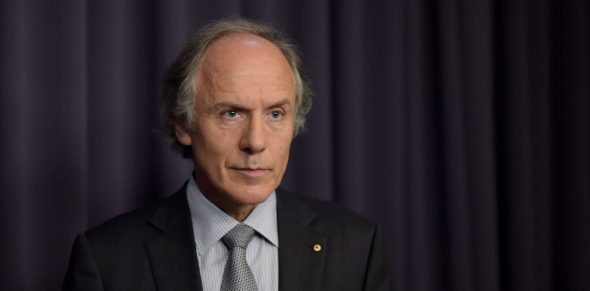Australia’s chief scientist, Alan Finkel, has named battery and energy storage as one of Australia’s biggest economic and innovation opportunities as the electricity grid shifts to renewable energy generation and consumer expectations evolve.
In his delivery of the Zunz Lecture at Sydney’s Powerhouse Museum on Thursday night, Finkel said energy storage was “one of the big opportunities” he saw on Australia’s horizon; and one of the questions the National Electricity Market review would have to consider.

“While the NEM has served us well, it is nevertheless under pressure from technologies and expectations that are a giant leap from what existed when it was designed,” he said in a speech titled Electric Future: Wiring for Progress.
Finkel said energy storage of all types – including batteries, pumped hydroelectricity and potentially even hydrogen storage – would be the focus of the first in series of new “horizon-scanning reports” commissioned by the Commonwealth Science Council, in an effort to gain insight into the scope of the opportunities presented by the burgeoning sector.
“There is tremendous opportunity for Australian innovation at every point of the (energy storage) chain – from R&D, to manufacturing, to service delivery, to standards and regulations,” Finkel said.
“First, because it is one way we can deal with the problem of intermittency whilst harnessing renewable energy across the grid; and second, because it is a field in which we are starting to play particularly well.”
Finkel pointed to local battery maker Redflow as an example of what can be achieved, as well as Brisbane-based company Tritium, which he noted had spun out of a university solar car challenge to become a highly successful manufacturer of fast-charging stations for electric cars.
“Charge your battery at home – and you’ll wait up to 20 hours. At a Tritium fast charge station you’re done in an hour. And you’ll find them in Germany, Austria, Switzerland, New Zealand, and now coast to coast in the United States,” he said.
Finally, Finkel mentioned the “millions of consumers who leapt at the potential of rooftop solar,” and who were bound to be “keenly interested in batteries as well.”
This same logic has been used by any number of international battery makers as the basis of their decision to launch their residential offerings on the Australian market.
“With good will and time on our side, electricity generation can be decarbonised. Whether it’s hydroelectric dams, or solar and wind, there are many viable technology paths to cutting emissions,” Finkel said.
“There are challenges in bringing them online, but over time, the solutions will come – just as we have learned to harness new technologies before. Our electricity generation mix is changing, and will continue to change. Ultimately, it is the market and the science that will decide.”










